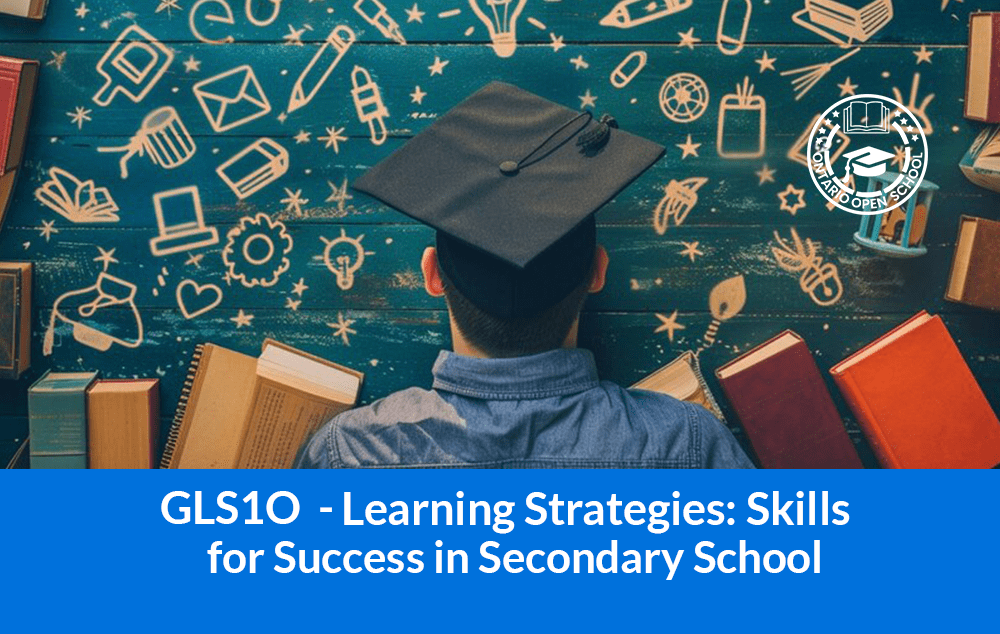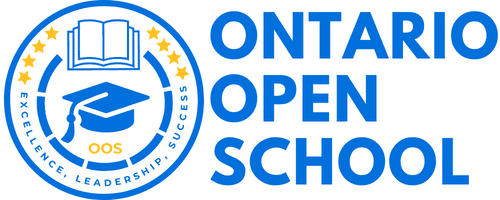- info@ontarioopenschool.com
- 647-494-4499
-
Unit 100 - 29 Gervais Drive, North York, ON.
M3C 1Y9
Copyright 2024 Ontario Open School Inc. All Rights Reserved.
This course focuses on learning strategies to help students become better, more independent learners. Students will learn how to develop and apply literacy and numeracy skills, personal management skills, and interpersonal and teamwork skills to improve their learning and achievement in school, the workplace, and the community. The course helps students build confidence and motivation to pursue opportunities for success in secondary school and beyond.
Unit Order | Unit Name | Suggested Time |
|---|---|---|
| Unit 1 | Study Strategies In this unit, students will begin to explore study strategies. This will include learning about organization skills, note-taking strategies, time management (and procrastination!) and finally study skills and test-taking strategies. Students will use the knowledge in this unit to help improve their own study strategies. | 25 hours |
| Unit 2 | Learning Skills In this unit, students will explore different learning skills and their individual strengths and weaknesses. Students will identify different learning styles (Visual, Verbal, Logical, …etc.) and their own personal strengths and weaknesses. Students will also, identify different measurements of success that can help them in their personal learning needs. | 25 hours |
| Unit 3 | Literacy skills In this unit, students begin to explore the world of literacy skills & identify a variety of literacy skills and strategies to improve their reading, writing, and oral communication in everyday contexts. Students will also, explore a few of the tasks on the Ontario Secondary School Literacy test which they write in Grade 10. | 27 hours |
| Unit 4 | Exploration of Opportunities In this unit, students will apply their knowledge of school, work, and community involvement opportunities to develop a personal learning plan; Demonstrate an understanding of school and community resources and how these can be utilized to support their learning needs; Develop a portfolio of documents pertaining to self-assessment, research, and career exploration that are necessary for planning a pathway for secondary school success. | 25 hours |
| Final Evaluation 30% | Final Project Final Exam | 6 hours 2 hours |
| Total | 110 Hours |
A variety of strategies are used to allow students many opportunities to attain the necessary skills for success in this course. The teacher uses a variety of whole class, small group and individual activities to facilitate learning. The following is a list of specific teaching/learning strategies that the teacher may use but is not limited to:
|
In – class discussion Problem solving Group discussion Peer partner learning Interviewing Concept formation |
Structured overview
Lecture Creative Writing Demonstrations Multi Media Presentation Student Teacher Conference |
Reflective discussion Guided thinking Internet research Homework Assigned questions Inquiry |
Purpose
The primary purpose of assessment is to improve student learning. Assessment relates directly to the expectations for the course.
A variety of assessments for and as learning are conducted on a regular basis to allow ample opportunities for students to improve and ultimately demonstrate their full range of learning and for the teacher to gather information to provide feedback. Assessment tasks relate to the success criteria set out in lesson plans. Success criteria allow students to see what quality looks like.
Evaluation is the process of judging the quality of student work in relation to the achievement chart categories and criteria and assigning a percentage grade to represent that quality. Evaluation is based on gathering evidence of student achievement through:
Assessment for Learning – we provide feedback and coaching. Assessment FOR Learning is the process of seeking and interpreting evidence for the use of learners and their teachers to decide where the learners are in their learning, where they need to go, and how best to go there.
Assessment as Learning – we help students monitor progress, set goals, reflect on their learning
Assessment AS Learning is the process of the explicit fostering of students’ capacity over time to be their own best assessors, but teachers need to start by presenting and modeling external, structured opportunities for students to assess themselves.
Assessment of Learning – we use assessments to provide evaluative statements about student achievement. Assessment OF Learning is the assessment that becomes public and results in statements of symbols
(marks/grades/levels of achievement) about how well students are learning. It often contributes to pivotal decisions that will affect students’ future.
ASSESSMENT TOOLS
|
Assessment and Evaluation Evaluation in this course will be continuous throughout the year and will include a variety of evaluation methods. The tools highlighted will be used for the three different types of assessments: |
||
|
Assessment as Learning |
Assessment for Learning |
Assessment of Learning |
|
Student Product: Learning Logs (anecdotal) Homework Checklist (Units) Self – evaluation sheet
|
Student Product:
Pre – tests (scale/rubric) Quizzes (scale/rubric) Homework Peer feedback (anecdotal/checklist) Vocabulary notebooks (anecdotal) |
Student Product: Assignments Tests (scale/rubric) Exam Journal (Scale /Rubric Project Presentation Essay |
|
Observation: Whole class discussions (anecdotal)
|
Observation:
Class discussions (anecdotal) Performance tasks (anecdotal/scale) |
Observation: PowerPoint presentations (rubric) Performance tasks (anecdotal/scale) |
|
Conversation: Student teacher conferences (checklist) Small group discussions Pair work (checklist)
|
Conversation:
Student teacher conferences (checklist) Small group discussions (checklist) Peer – feedback (anecdotal) |
Conversation: Student teacher conferences (checklist) Small Group Discussion
|
Resources
Growing Success: Assessment, Evaluation and Reporting in Ontario Schools (2010)
http://www.edu.gov.on.ca/eng/policyfunding/growSuccess.pdf
Grading
Weighting of categories
| Knowledge/Understanding | Thinking/Inquiry | Communication | Application |
| 25% | 25% | 25% | 25% |
|
Percentage of Final Mark |
Categories of Mark Breakdown |
|
70% |
Term work (Unit tests, Assignments) [70%] |
| 30% |
Portfolio – 30% |
|
Of the 100%:
|
|

Course Grade | Grade 9 |
|---|---|
Course Code | GLS1O |
Course Category | Guidance and Career Education |
Course Type | Open |
Course Delivery | Online |
Course Duration | 8hrs |
Course Credit | 0 |
Copyright 2024 Ontario Open School Inc. All Rights Reserved.
